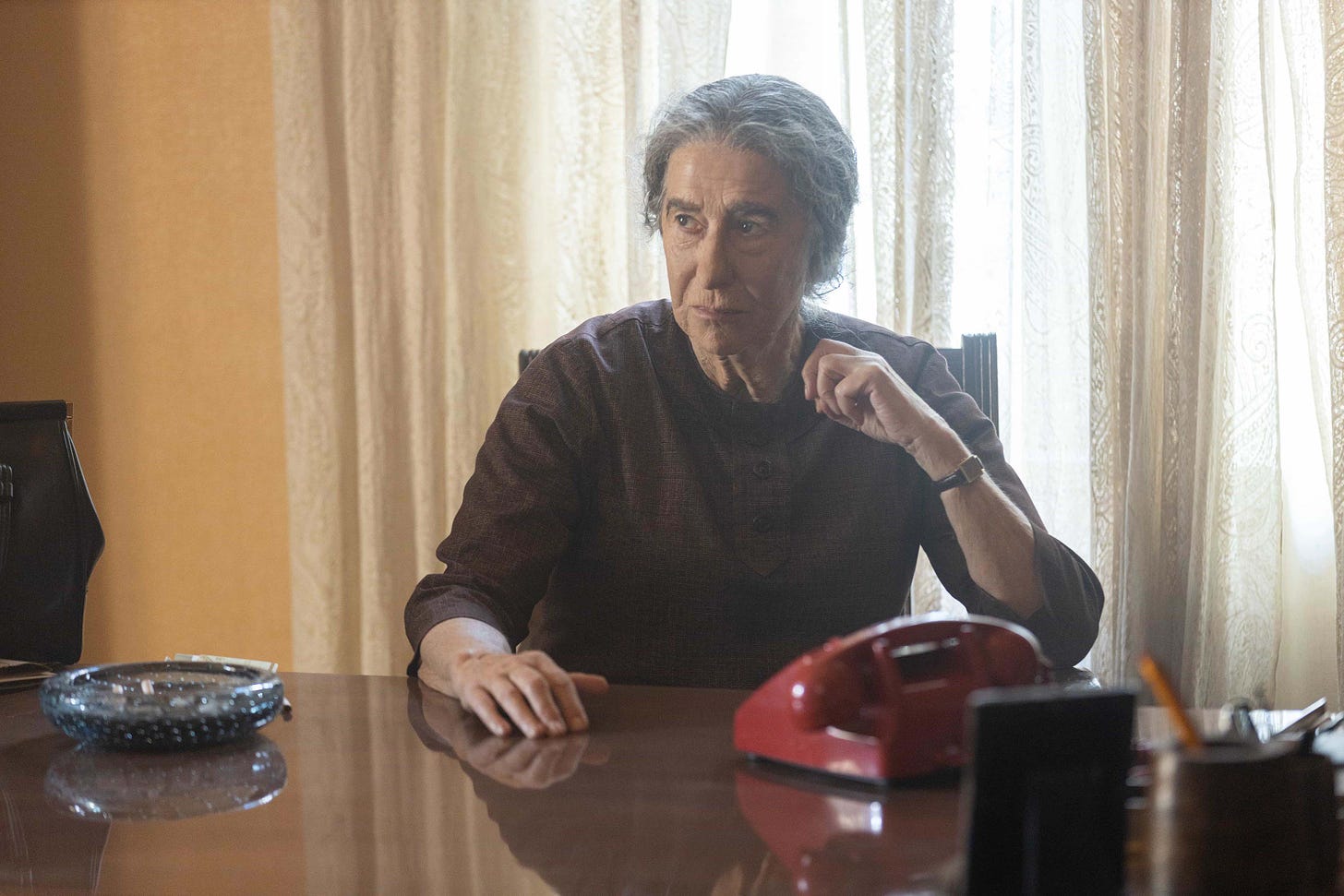Golda Meir was a towering personage. I grew up hearing about her from my mom, who has always told me how brilliant and stalwart Meir was. In terms of historical stakes Meir is kind of a meeting point of such figures as Winston Churchill and Margaret Thatcher in that she was fighting for the survival of Israel while also doing what no woman in Israel had done before. Unlike Churchill and Thatcher, however, the role of prime minister was thrust upon Golda, and she did it while suffering from leukemia.
Yep, she was quite a lady.
The film doesn’t cover all of Golda’s life but sticks to the Yom Kippur War, which is what Meir is most famous for, and it’s bookended by the Agranat Commission of Inquiry. Director Guy Nattiv keeps the film’s style very pragmatic with the exception of some dead birds lining a hallway in a key scene and a lone dream sequence showing how traumatized Golda was over so many Israelis dying and her feeling of losing control of the situation. The film has a pretty distinct docudrama flavor, with names of Golda’s various staff popping up as needed, plus there’s quite a bit of actual footage of the real Golda.
Helen Mirren as Golda has caused some controversy, not only because she isn’t Israeli, but she was also made up heavily for the part and smokes in almost every scene. I don’t believe this is quite fair, because Golda herself was Ukrainian-born and grew up in Wisconsin and Colorado, heading to Palestine with her husband in 1928. Mirren’s makeup is definitely heavy, but it’s not nearly on the level of, say, the 1933 version of Alice In Wonderland, and seeing as Golda was a chain smoker, it’s not really fair to discount this element of the film, either.
Instead, Mirren’s portrayal strikes a compelling balance, showing Golda as both strong and caring. On one hand, we see Golda telling a distraught staff member to go home, wash his face, and “snap out of it,” but on the other hand, she shows compassion to a stenographer whose son was a prisoner of war and later among the dead. When Golda holds a meeting of her military and staff members in the living room of her office, she brings a cake. Henry Kissinger gets borscht when he visits to discuss the cease-fire between Israel and Syria.
There are a few moments of levity but also some irony: Every time Golda arrives at the hospital for her radiation treatments, she has to pass through the morgue, which is more and more filled with bodies as the war goes on.
And we see Golda in her vulnerable moments. She loses some of her hair from the cancer treatments, crouched in the tub while her aide cleans the falling hair off her bare back. She has to be reminded to eat. She sinks down in chairs and weeps while listening to the live audio from the battlefront. Every time she’s given casualty numbers she writes them down in a notebook, her face awash in grief.
The only part of the movie that I thought was a little weak was the Court of Inquiry because it’s not that integral to the movie as a whole, only showing up two or three times over the course of the film. I wish this wasn’t the case, because the purpose of Golda is to vindicate Golda Meir’s role in the Yom Kippur War, so it would have been great if Golda could have told her own story more.
Then again, the hearing allows Golda to get the last word, which she requests the recorders leave out of the public record. She did the best she could, she triumphed in the end, and she left a very distinctive mark on world history.
Golda is currently in select theaters. Rated PG-13.
My grade: A-
Principal Cast: Helen Mirren, Liev Schreiber, Zed Josef, Claudette Williams, Henry Goodman, Olivia Brody, Emma Davies, Camille Cottin, Jonathan Tafler, Ellie Piercy, Rami Heuberger, Dvir Benedeck, Lior Ashkenazi, Ed Stoppard, Dominic Mafham, Marc Fleishmann, Daniel Ben Zenou, Jaime Ray Newman
Directed by Guy Nattiv.
Written by Nicholas Martin.




